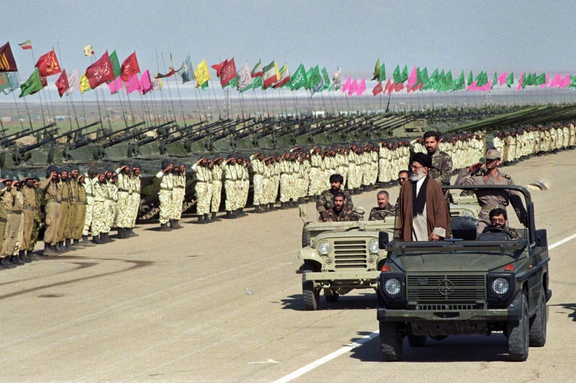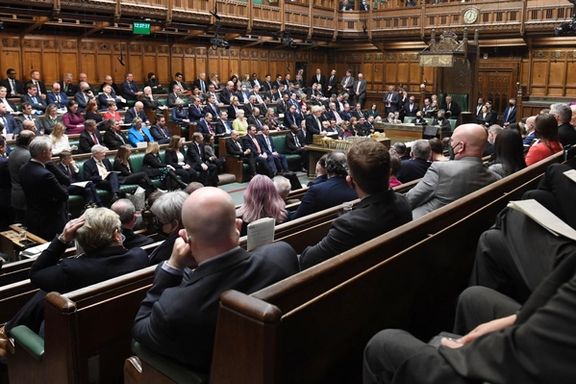British MPs Repeat Calls For Proscription Of Iran’s IRGC

As Iran-backed protests continue to flame unrest in the UK, 70 lawmakers have again urged PM Rishi Sunak to list the IRGC as a terrorist organization.

As Iran-backed protests continue to flame unrest in the UK, 70 lawmakers have again urged PM Rishi Sunak to list the IRGC as a terrorist organization.
The debate as to whether or not to designate Iran’s Revolutionary Guard as terrorist, like the US has done, has been a cause of bitter divide in the British parliament, as elsewhere. Iranians in the UK have also long joined the calls.
While individuals and entities related to the IRGC have been issued with sanctions from the UK and nations including Canada, the US and European Union member states, lawmakers say it does not go far enough.
According to The Telegraph, the letter has been signed by Lord Carey, the former Archbishop of Canterbury, as well as Tory grandees Sir Iain Duncan Smith, David Davis and Liam Fox and ex-head of the Army Lord Dannatt.
The group claims there is a “compelling and indisputable” case for proscribing the group to keep the UK and its citizens safe. The US proscribed the IRGC in 2019.
In a statement the group cited Scotland Yard’s claims that Iran has made at least 15 attempts since the start of 2022 to kidnap or even kill British or UK-based “enemies”. Additionally, they pointed out that Ken McCallum, the director general of MI5, has also warned that Tehran is a direct threat to the UK “through its aggressive intelligence services”.

An investigation in The Times revealed that British officials have identified more than half a dozen UK-based groups with direct ties to Tehran amid fears the hostile state is stirring up tension over the conflict in Israel.
The anti-Israel protests have stirred bitter debate in the UK where police have allowed the hundreds of thousands strong protests to continue, while containing more nationalist counter demonstrators.
Suella Braverman, the home secretary, last week accused London’s Met Police of showing bias when it came to demonstrations and of favouring left-wing causes and what she called pro-Palestinian “mobs”, many openly supporting Hamas with little legal ramifications.
The statement from the MPs argues that proscription would be in the interest of national security at home, as well as “peace, stability and justice” in the Middle East, where since the war broke out, Iranian proxies in Syria, Lebanon and Yemen have not only joined the war on Israel, but also attacked US facilities in Syria and Iraq.
Garnering a majority of Iran’s defense budget, since the 1979 revolution, the IRGC has become a major military, political, intelligence and economic force in the country. Its influence has spread not only across the Middle East as it supports Iran’s proxies in the region, but has since seen activity in the likes of the UK and US.
Earlier this year, Iran International’s UK offices were forced to temporarily relocate to Washington after national security agency MI5 said it could no longer protect the team who were under threat from IRGC agents.
In the US, it has also carried out numerous attempted attacks, not least to avenge the assassination of Quds Force Commander, Qassem Soleimani, killed by the US in 2020 under the Trump administration.
The Telegraph reported that in their statement, the parliamentarians argue that the group’s role in providing terrorists with weapons, training and financial support, as well as “fomenting violence and conflict” in the region, is “undeniable”.
“Their actions have exacerbated conflicts and hindered the path to peace,” they said.
“We strongly believe that the proscription of the IRGC is not only a global necessity, but also in the interests of our own national security.”
Foreign Secretary James Cleverly has been reluctant to proscribe the IRGC in the face of increasing calls, not least since the Hamas terror attack on October 7. Iran funds its biggest Palestinian proxy at least $100m a year and supports it with arms, training and technical support.
In the months leading up to the attacks, Iranian leaders had top level meetings with Hamas and Hezbollah chiefs, signalling complicity in the attacks which were the single most deadly day for Jews since the Holocaust.
The British Prime Minister has since come under further pressure to designate the group since the war in Israel. Iranian proxies have become ever more activated, showing the potential threat the IRGC poses not only in the Middle East, but globally.
The parliamentarians’ statement concluded: “We call upon our Government to recognise the urgency of proscribing the IRGC as a terrorist organisation and proceed to do so. Such a decision would constitute a significant step towards peace, stability, and justice in the Middle East and beyond.”
In response to the letter, the UK government spokesman told The Telegraph: “We continue to take strong action against Iran while they threaten people in the UK and around the world. The UK has sanctioned more than 350 Iranian individuals and entities, including the Islamic Revolutionary Guards Corps in its entirety.
“Whilst the Government keeps the list of proscribed organisations under review, we do not comment on whether a specific organisation is or is not being considered for proscription.”